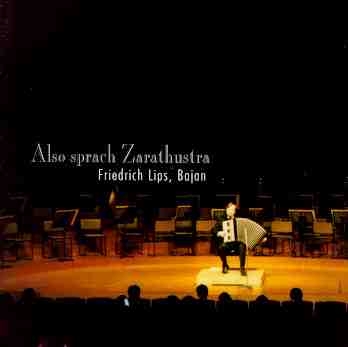
Friedrich Lips, bayan
Also sprach Zarathustra

Friedrich Lips, bayan
Program:
W. Solotarjow: Sonata #3
A. Larin: Three Pieces
K. Wolkow: Sonata #1
E. Derbenko: Toccata
S. Berinski: Also sprach Zarathustra - a partita in four movements
Total Time: 57:36
label: LIPS CD (009)
Order through: Dr. Herbert Scheibenreif
Resselgasse 2
2620 Neunkirchen
Austria
telephone and fax: +43-2635-69421
email: herbert@accordion-cd.co.at
Review by Henry Doktorski:
This album is not for the faint-of-heart; it is serious concert music of the highest caliber. It is not background music or music to relax to; it demands full concentration and attention from the listener.But those who allow themselves to become absorbed in these works may experience a mystical transformation; an awakening, for this music may not be "pretty," but it is always dramatic and profound.
Friedrich Lips, in my opinion, is one of the few concert accordionists on the earth today, who has sufficient technique, maturity and scholarship to bring these difficult works alive.
The "Sonata #3" by Solotarjow is lengthy (21:58) and full of pathos. The center of the sonata is the tragedy; the battle against evil powers, as well as the confirmation of pure beauty and light harmonies. At times it is dark and eerie, as in the second movement which begins with a pianissimo ostinato bellows shake which is punctuated by the medieval chant from the mass for the dead: "dies irae, dies illa solvet saeclum in favilla" - "the day of wrath, that day of grief shall change the world to glowing ash."
The three lighter pieces by Larin provide a welcome contrast to the weightier first sonata. The opening theme of the first movement, (the first five notes of the ascending minor scale: la, ti, do, re, mi), is note-for-note exactly the same as the opening theme of the "sostenuto tranquillo" from the first movement of the popular "new-age" Symphony #3 (1976) by Henryk Gorecki.
The sonata by Wolkow is another highly dramatic work and Lips' performance is powerful and full of virtuosity . He has a command over his instrument which is remarkable.
The partita, "Also sprach Zarathustra" by Sergei Berinski is based on Friedrich Nietzsche's well-known quotation. Equally famous is the symphonic poem by Richard Strauss, (quoted in the movie "2001: a Space Odyssey,") that holds the same title.
The first movement exhibits enormous emotional power which transforms into a dance of aggressive and wild character. The third movement (choral) represents the departure to the transcendent world and the fourth movement (a lullaby) presents a meditation a bout life, human nature and death.
Berinski, like Solotarjow and hundreds of other composers before him, quotes the "Dies irae" theme in this work.
Sometimes, during very quiet sections, the listener may be distracted by a noticeable tape hiss in the background, and occasionally at the beginnings of pieces one hears "print through," that annoying ghost-like echo which immediately precedes a fortissimo entrance. This occurs when analog recording tape sits on the shelf too long. I hope future Lips releases will take advantage of digital technology, thereby greatly reducing such drawbacks.
I highly recommend this album for lovers of 20th century classical accordion music who are not afraid to surrender themselves to powerful and dramatic music. The CD booklet is printed in English, German and French.
| About The Free-Reed Review |
| Invitation to Contributors / Submission Guidelines |
| Back to The Free-Reed Review Contents
Page |
| Back
to The Classical Free-Reed, Inc. Home Page |